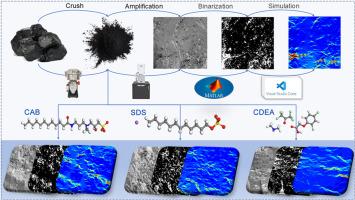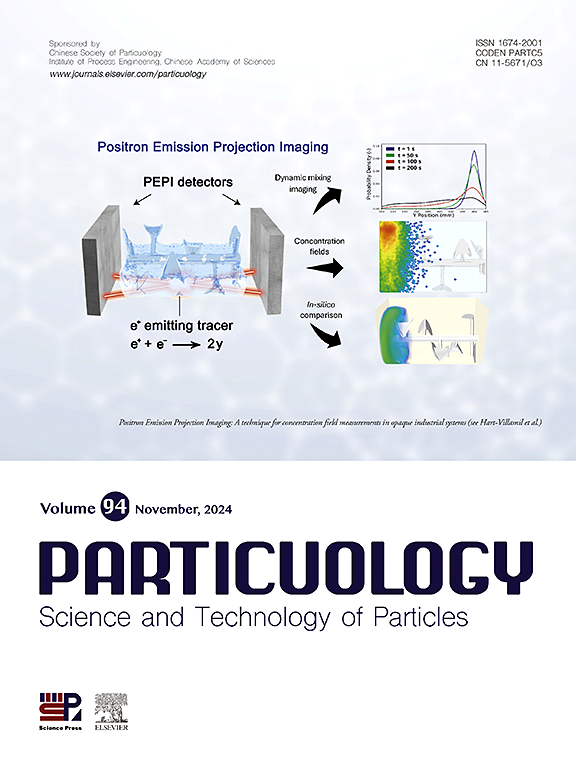煤炭注水过程中表面活性剂对渗流规律影响的中尺度建模
IF 4.1
2区 材料科学
Q2 ENGINEERING, CHEMICAL
引用次数: 0
摘要
为了研究煤层注水过程中表面活性剂对渗流规律的中观影响,本文创新性地建立了一个流体输运晶格玻尔兹曼(LBM)模型,将多孔介质产生的渗流阻力和外力结合在一起,体现了浓度为0.1%的椰油酰胺丙基甜菜碱(CAB)、十二烷基硫酸钠(SDS)和椰油二乙醇酰胺(CDEA)试剂所产生的润湿度的影响。这项研究得出的主要结论如下:首先,随着 X 方向晶格数的增加,经去离子水、0.1% CAB、0.1% SDS 和 0.1% CDEA 试剂处理的煤样(1 号、2 号、3 号和 4 号)的平均渗流速度呈现出三个明显的阶段:快速下降、缓慢下降和稳定下降;与原煤样相比,改性煤样分别下降了 20.84%、33.91% 和 61.70%。其次,在改性试剂在整个流道中扩散时,存在位移压差的临界值,2 号、3 号和 4 号煤样分别为 3.5、3.5 和 5.2 兆帕;这表明超过这些临界值有助于防止润湿范围内出现空白带和粉尘控制不足等问题。最后,在位移压差为 0.01(晶格单位)时,2 号、3 号和 4 号煤样的平均流速比分别为 0.78、0.56 和 0.37(晶格单位);值得注意的是,改性煤样的水流速度比原煤样低,这表明表面活性剂的添加阻碍了煤层注水的渗流过程。此外,当位移压差达到0.03(晶格单位)时,CDEA改性煤样的流速比超过100%,这意味着当位移压差超过15.6 MPa时,CDEA改性煤样的注水效果开始得到改善。这些研究成果为提高煤矿注水技术提供了理论依据。本文章由计算机程序翻译,如有差异,请以英文原文为准。

Mesoscale modeling on the influence of surfactants on seepage law during water injection in coal
To investigate the mesoscopic influence of surfactants on seepage law during water injection in coal seam, this paper innovatively establishes a fluid transport lattice Boltzmann (LBM) model by incorporating the seepage resistance generated from the porous media and external forces, which embodies the impact of wettability degree resulted from cocamidopropyl betaine (CAB), sodium dodecyl sulfate (SDS), and coconutt diethanol amide (CDEA) reagents at a 0.1% concentration. The main conclusions derived from this investigation are as follows: Firstly, as the lattice number in the X direction increases, the average seepage velocities in coal samples treated by deionized water, 0.1% CAB, 0.1% SDS, and 0.1% CDEA reagents (Nos. 1, 2, 3, and 4) exhibit three distinct stages: rapid decline, slow decline, and steady decline; in comparison to raw coal sample, modified coal samples demonstrate decreases of 20.84%, 33.91%, and 61.70%, respectively. Secondly, the critical values of displacement pressure difference exist during the phenomenon that modified reagents spread out in the entire flow channel, which are 3.5, 3.5, and 5.2 MPa, respectively, for coal samples Nos. 2, 3, and 4; this signifies that surpassing these critical values help prevent issues such as blank belts within the wetting range and insufficient dust control. Finally, at a displacement pressure difference of 0.01 (lattice unit), the average velocity ratios for samples (Nos. 2, 3, and 4) are 0.78, 0.56, and 0.37 (lattice unit), respectively; notably, the water flow velocities in modified coal samples are lower compared to that in raw coal sample, indicating that the addition of surfactants impede the seepage process of water injection in coal seam. Moreover, when the displacement pressure difference reaches 0.03 (lattice unit), the velocity ratio of CDEA-modified coal sample exceeds 100%; this means that when the displacement pressure difference surpasses 15.6 MPa, the water injection effect of CDEA-modified coal sample begins to be improved. These research findings offer a theoretical basis for enhancing water injection technology in coal mines.
求助全文
通过发布文献求助,成功后即可免费获取论文全文。
去求助
来源期刊

Particuology
工程技术-材料科学:综合
CiteScore
6.70
自引率
2.90%
发文量
1730
审稿时长
32 days
期刊介绍:
The word ‘particuology’ was coined to parallel the discipline for the science and technology of particles.
Particuology is an interdisciplinary journal that publishes frontier research articles and critical reviews on the discovery, formulation and engineering of particulate materials, processes and systems. It especially welcomes contributions utilising advanced theoretical, modelling and measurement methods to enable the discovery and creation of new particulate materials, and the manufacturing of functional particulate-based products, such as sensors.
Papers are handled by Thematic Editors who oversee contributions from specific subject fields. These fields are classified into: Particle Synthesis and Modification; Particle Characterization and Measurement; Granular Systems and Bulk Solids Technology; Fluidization and Particle-Fluid Systems; Aerosols; and Applications of Particle Technology.
Key topics concerning the creation and processing of particulates include:
-Modelling and simulation of particle formation, collective behaviour of particles and systems for particle production over a broad spectrum of length scales
-Mining of experimental data for particle synthesis and surface properties to facilitate the creation of new materials and processes
-Particle design and preparation including controlled response and sensing functionalities in formation, delivery systems and biological systems, etc.
-Experimental and computational methods for visualization and analysis of particulate system.
These topics are broadly relevant to the production of materials, pharmaceuticals and food, and to the conversion of energy resources to fuels and protection of the environment.
 求助内容:
求助内容: 应助结果提醒方式:
应助结果提醒方式:


